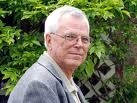Mom was afraid of the water. On a beach vacation to South Padre Island, when she was six, the undertow dragged her beneath the churning waves. She recovered from the accident, but as an adult she suffered panic attacks in the swimming pool. If baptism meant she had to be dunked, she’d rather have gone to hell.
I inherited her fear. When I was six and splashing around in the kiddy pool, my swimming coach tried to coax me to blow bubbles. “Nothing to be afraid of,” he said. “Just put your face in the water.” He turned to Mom and said, “You show him.” I can still see the terror in my mommy’s eyes, her face framed by her yellow rubber bathing cap, as she held her breath and slowly lowered her head into the water. Up came the gurgling bubbles. Then up came Mommy, spewing water, choking but alive. She did it because she loved me.
In The Road Less Traveled, M. Scott Peck defines love as “The will to extend one’s self for the purpose of nurturing one’s own or another’s spiritual growth.” The key phrase for me is “extend one’s self.” We grow as parents, grandparents, and teachers when we take the extra step or walk the extra mile, especially when doing so pushes our boundaries, like blowing bubbles did for Mom. I know this because raising Ben, my 22-year-old low-functioning child with autism, pushed my boundaries, challenged my limitations, engaged my fears, and forced me to become a more patient, trusting, empathetic person.
In raising our children, we have the opportunity to “raise” ourselves. All good parents do this, but children with autism or severe developmental disabilities like my son Ben present exceptional challenges because their behavior can be so exhausting and shaming – feces smearing, public meltdowns, sleeplessness, non-compliance. The setbacks can be so discouraging, the progress so slow. “You will not change me,” said the Autism Monster to author Catherine Maurice. “I will change you.” That’s a dark-sounding statement, but if we turn it around and look on the bright side, raising a child with autism is a life-long opportunity for change and growth.
In my experience, change can work both ways. With behavior therapy, neurofeedback, and biomedical and interventions, the prospect for at least partially reversing autism in pre-school children in the last 10 years has greatly improved, and progress is possible at any age. Yet the epidemic shows no signs of abating, and few afflicted kids escape the scourge utterly unscathed. As our children age out of the school system, those of us on the frontier of this epidemic are asking ourselves, “Where will my dependent adult child live, learn, work, play, heal, and find friends now that the school bus has stopped coming?” Answering those questions requires us to push hard against the existing boundaries of our lives. Fear. Money. The incessant undertow.
Yet, for those of us with adult children, the hardest part of our journey is over. We have crossed the continental divide. The highest pass is behind us, and the wind is to our back. As trailblazers, we have learned three empowering lessons: that our lives are not about us, that we cannot lose what we give away, and that living outside the envelope of social and family expectations, we are free.
--
Dan E. Burns, Ph.D.
Saving Ben: A Father's Story of Autism - UNT Press
www.SavingBenBook.com
Vaccines Cause Autism
Dan Burns, PhD, graduated from Oklahoma State University with a PhD in English in 1979. In 1990 his third child, Benjamin, was diagnosed with autism. Dan and his wife, Susan, explored early biomedical and behavioral treatments. In 1992 the couple divorced and Dan became the primary advocate for his severely autistic son. In 2006, Dan and his former wife joined forces to implement the new biomedical protocols coming out of the Defeat Autism Now! movement, including diet, antifungals, antivirals, anti-inflammatories, nutritional support, and detoxification. In support of these therapies, Dr. Burns has maintained a rigorous aerobic exercise program for his son, including biking, running, and swimming.

